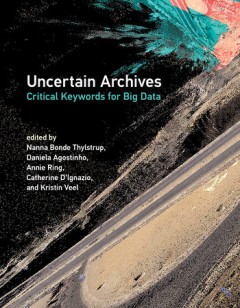Filter by

Uncertain archives :critical keywords for big data
"The ambition of this book is to examine in close detail the whole range of epistemological, political and ethical uncertainties that are being raised by big data in our time"--OCLC-licensed vendor bibliographic record.
- Edition
- -
- ISBN/ISSN
- 0262361280
- Collation
- 1 online resource.
- Series Title
- -
- Call Number
- -

Reasoning about uncertainty
Formal ways of representing uncertainty and various logics for reasoning about it; updated with new material on weighted probability measures, complexity-theoretic considerations, and other topics.OCLC-licensed vendor bibliographic record.
- Edition
- Second edition.
- ISBN/ISSN
- 9780262340496
- Collation
- 1 online resource (xv, 488 pages) :illustrations
- Series Title
- -
- Call Number
- -

Qualitative methods for reasoning under uncertainty
In this book Simon Parsons describes qualitative methods for reasoning under uncertainty, "uncertainty" being a catch-all term for various types of imperfect information. The advantage of qualitative methods is that they do not require precise numerical information. Instead, they work with abstractions such as interval values and information about how values change. The author does not invent c…
- Edition
- -
- ISBN/ISSN
- 9780262256773
- Collation
- 1 online resource (xviii, 506 pages) :illustrations.
- Series Title
- -
- Call Number
- -
 Computer Science, Information & General Works
Computer Science, Information & General Works  Philosophy & Psychology
Philosophy & Psychology  Religion
Religion  Social Sciences
Social Sciences  Language
Language  Pure Science
Pure Science  Applied Sciences
Applied Sciences  Art & Recreation
Art & Recreation  Literature
Literature  History & Geography
History & Geography